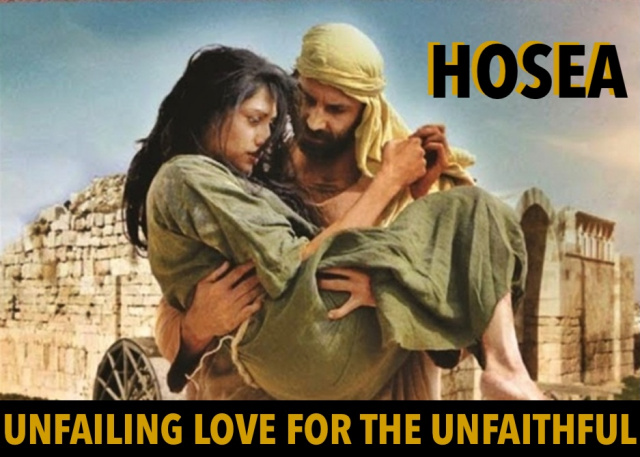
Introduction: Hosea is a book containing Hosea’s prophecy about the spiritual harlotry of Israel. It is unique in the unique way God has Hosea to practice what he preached. Just as God wanted to redeem His idolatrous people, despite their spiritual harlotry and unfaithfulness to Him, God commands Hosea to redeem his adulterous wife, despite her shameless harlotry and unfaithfulness to him.
This book, more than any other in the Bible, takes the pulse of the throbbing, broken heart of God over His people’s unfaithfulness and idolatry. It shows how judgment of sin is demanded by a just God, but how a just God takes no joy in judging sinners. It is therefore the Bible’s best treatise on both the inevitability of God’s judgment on all sin and God’s unconditional love for all sinners.
Hosea 1:1 — Hosea’s prophetic career, unlike that of other Old Testament prophets, extended over a considerable period of time. It commenced under the reigns of Judah’s Uzziah and Israel’s Jeroboam, around 760 BC, and continued until the reign of Judah’s Hezekiah, about 725 BC.
Thanks to the imposed death penalty upon all false prophets and the possibility of life-imperiling persecution against all true prophets, those who once donned the prophet’s mantle, for the most part, had both brief careers and short life spans.
Hosea 1:2-3a — Hosea is instructed to marry a shameless harlot, in order to illustrate Israel’s spiritual harlotry.
Idolatry is spiritual harlotry, since it is the prostituting of ourselves to other lovers besides the Lord. Anything that rivals our affection for God is an idol or a false god.
Hosea 1:3b-5 — Hosea is instructed to name his and Gomer’s firstborn son “Jezreel,” as an omen of God’s impending judgment, which would not only avenge the blood shed in the city of Jezreel, but would also break the bow of Israel in the Valley of Jezreel.
This ominous omen was a portent of a pair of impending judgments. First, because of Jehu’s bloody and brutal murder of the house of Ahab in the city of Jezreel, God would bring about an abrupt and absolute end to Jehu’s dynasty with the assassination of Zechariah, after which no descendant of Jehu would ever again ascend the throne of Israel. Second, because of Israel’s insolence and idolatry, God would bring about an end to Israel itself, when its army would be defeated by the invading Assyrians in the Valley of Jezreel.
Hosea 1:6 — Hosea is instructed to name his and Gomer’s second child, a daughter, “Lo-Ruhamah,” which means “no mercy,” for Israel’s sin had become inexpiable and God’s judgment upon Israel inevitable.
Contrary to popular opinion, people can pass a point of no return with God, when God’s merciful forgiveness is no longer available and His merciless judgment is no longer avoidable.
Hosea 1:7 — Whereas God’s patience was exhausted and His mercy no longer extended to the Northern Kingdom of Israel, which would be defeated and destroyed by Assyria, God would mercifully and miraculously deliver the Southern Kingdom of Judah from Assyria.
When the army of Sennacherib, the king of Assyria, laid siege to Jerusalem, the capital of Judah, God saved the city by sending an angel into the Assyrian camp to kill 185,000 Assyrian soldiers overnight. (1 Kings 19:35; Isaiah 37:36)
Hosea 1:8-9 — Hosea is instructed to name his and Gomer’s third child, a second son, “Lo-Ammi,” which means “not mine,” for the child, which was not Hosea’s, symbolized how the idolatrous people of Israel were no longer the children of God.
Professed Christians, who practice idolatry, prove themselves to be illegitimate children of God.
Hosea 1:10-11 — Despite the idolatrous and illegitimate children of God in Hosea’s day, the prophet predicts a day when God’s legitimate children will be as innumerable as the sand of the sea, undivided in their love for the living God, and living under His Lordship alone.
The name “Jezreel” literally means “God sows.” Therefore, the great day of Jezreel is to be understood as the day when Christ comes to bring to fruition all that God has sown. Then, with Christ alone seated on the throne of Israel as both the lone Lord and love of all the earth, there will no longer be illegitimate children of God, but only lovers of Christ alone who can legitimately call God their Father and who God will lovingly call His sons and daughters.
Hosea 4:6 — Contrary to popular opinion, ignorance is not bliss, but oblivion, not only to ourselves, but also to our children.
Hosea 7:14 — Prayers without heart to Heaven never go.
Hosea 9:8 — Satan, the fowler, strews our paths with snares in hopes of a careless step on our part, which will result in him pulling the trip cord on some ensnaring temptation and us being snatched up off our feet and left hanging by our heels.
Hosea 14:4 — Although backsliding is self-inflicted, it can’t be self-remedied. Only God can heal it, so that we'll no longer be infuriating to Him, but once again loved freely by Him.
Hosea 14:5 — Contrary to popular opinion, dew doesn’t fall, but just appears when the atmospheric conditions are right. Likewise, God’s presence appears when the spiritual conditions are right, producing swift growth, like the lily, and sturdy growth, like the cedars of Lebanon.
Hosea 14:7 — The flowering, flourishing and fragrant Christian life is lived in the shadow of the Almighty; that is, persistently in His presence and perpetually preempted by His glory. It is only lived by God’s intimates who are overjoyed when overshadowed by His glory.
BACK TO TWEETS BY THE BOOKS